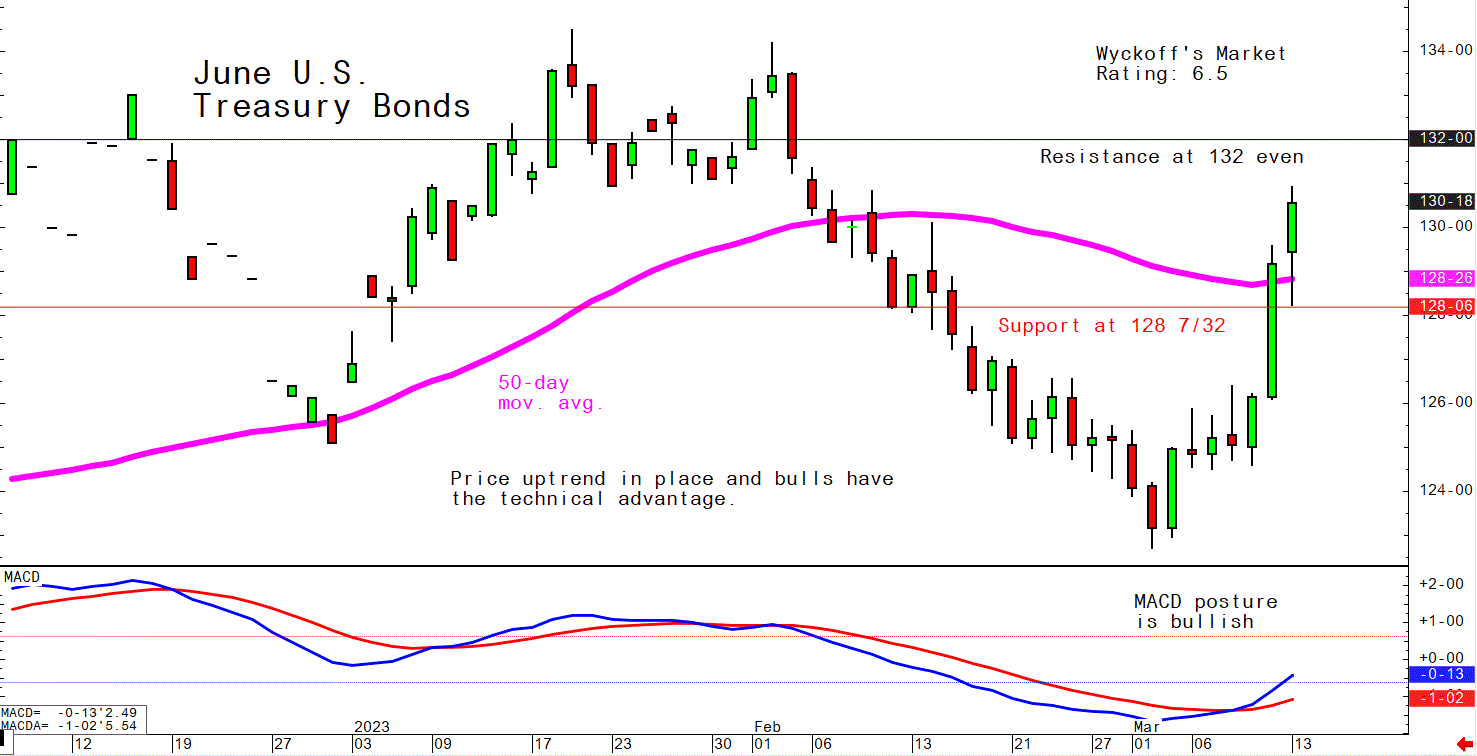President Biden Addresses Americans This Morning Re: Response to Bank Failures

SVB, Signature Bank depositors to get all their money as Fed moves to stem crisis
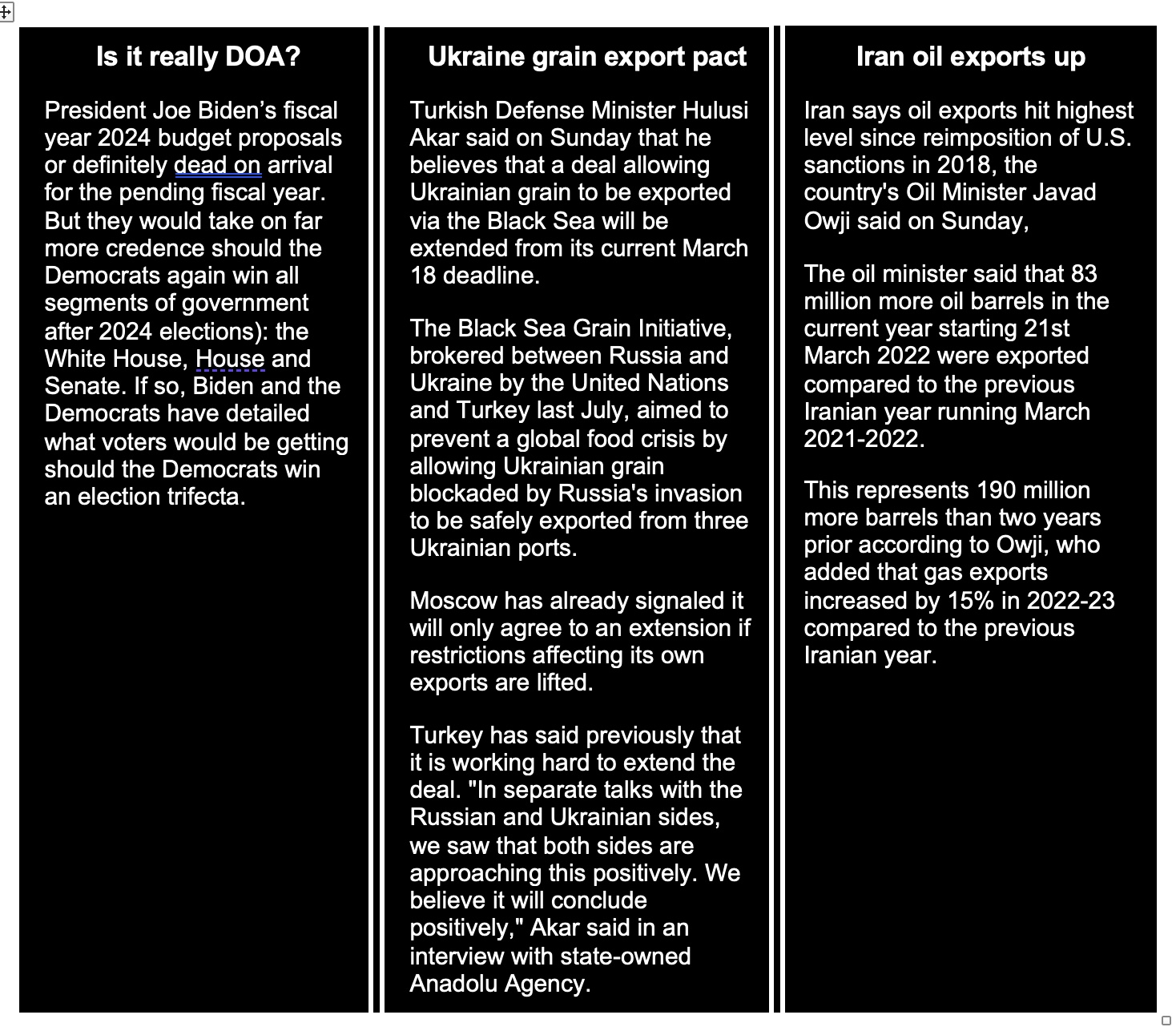
|
In Today’s Digital Newspaper |
Federal regulators announced that the government would ensure that all depositors of Silicon Valley Bank would have access to all of their money starting today, and that the losses would not be borne by American taxpayers. Amid the carnage, the Fed announced that it would set up an emergency lending program, with approval from the Treasury, to funnel funding to eligible banks and help ensure that they were able to “meet the needs of all their depositors.”
Regulators also announced that Signature Bank had been shut down by New York bank regulators to protect consumers and the financial system. It was the third bank failure within a week. More, below.
“This should be enough to stop the depositor panic.” — William Dudley, president of the New York Fed from 2009 to 2018.
Sevens Report: “The key remains stability in the regional banks and in Treasury yields (they need to stop collapsing). If regional banks (KRE) and yields stabilize, markets can rally.”
Recriminations are flying widely. The New York Times: “Regulators face questions about how they missed red flags at Silicon Valley Bank, while venture capitalists were criticized as helping to spark a run at the lender. S.V.B. executives also took flak for mismanagement, including by failing to hedge against rises in interest rates, and for paying out employee bonuses on Friday.” But much of the criticism was aimed at the banking industry itself, which pushed back hard against tougher regulations after 2008
Chinese President Xi Jinping is planning to travel to Russia to meet with his counterpart, Vladimir Putin, as soon as next week, according to Reuters. The Kremlin has repeatedly asked China to send weapons it can use in its war in Ukraine; China has so far demurred. China and Russia declared their “no-limits” friendship in February 2022, just weeks before Russia’s invasion began.
China kept some familiar faces in power following its big confab over the weekend. China named Li Qiang as premier, as expected, but surprisingly kept almost half of the 26 cabinet positions unchanged. PBOC Governor Yi Gang is staying. The new defense minister is Li Shangfu, under U.S. sanctions for dealings with Russia. More in China section.
China must redouble efforts to ensure stability and bolstering self-reliance, President Xi Jinping told lawmakers. He also vowed during the closing of the annual National People’s Congress on Monday to oppose foreign interference on Taiwan, a veiled reference to increasing American support for the democratically elected government in Taipei.
The Biden administration today will formally approve a huge oil drilling project (Willow) in Alaska and announce new restrictions on offshore oil leasing in the Arctic Ocean.
Residents in storm-battered California are bracing for another atmospheric river event Monday, with many areas still flooded from heavy rains last week that caused extensive damage and at least two fatalities. It's the eleventh such river event to hit the US West this winter weather season. More than 17 million people are under flood watches across California and Nevada early this morning, with rainfall totals of up to 8 inches possible across parts of northern and central California today, forecasts show.
|
MARKET FOCUS |
European stocks fall 2%, banks slide 4% after HSBC rescued Silicon Valley Bank, whose depositors, beginning today, will be able to access all of their funds, regulators announced. U.S. Treasury Department, the Federal Reserve, and the Federal Deposit Insurance Corporation (FDIC) have revealed the plan in a joint statement. Treasury Secretary Janet Yellen, after consulting with the president and regulators, has authorized the plan that “fully protects all depositors.” Currently, the maximum amount of protection provided by the FDIC to any one depositor is $250,000. However, under the new plan, all deposits, both insured and uninsured, will be protected. “Depositors will have access to all of their money starting Monday, March 13. No losses associated with the resolution of Silicon Valley Bank will be borne by the taxpayer,” according to the statement. “Shareholders and certain unsecured debtholders will not be protected. Senior management has also been removed. Any losses to the Deposit Insurance Fund to support uninsured depositors will be recovered by a special assessment on banks, as required by law.”
HSBC U.K. acquired SVB U.K. for £1 ($1.21), in a deal that excludes the assets and liabilities of SVB U.K.’s parent company. No other banks in Britain are directly affected, according to the Bank of England.
Regulators also announced a similar measure for New York-based Signature Bank, which was closed on Sunday by the state chartering authority. “All depositors of this institution will be made whole,” the joint statement said.
The Fed also announced on Sunday that it will make extra funding available to eligible depository institutions to help ensure banks can satisfy the requirements of all their depositors. “The Federal Reserve is prepared to address any liquidity pressures that may arise,” the Fed’s statement said. As part of the efforts to avert a banking crisis, the central bank announced the establishment of a new Bank Term Funding Program (BTFP) targeted at protecting deposits at failed institutions. The Treasury Department will “make available up to $25 billion from the Exchange Stabilization Fund as a backstop for the BTFP,” the central bank announced.
Market impacts: The market has significantly repriced Fed rate hike expectations. 50 bps this month looks unlikely now. Goldman no longer expects a Fed hike this month, although it still foresees hikes in May, June and July. Yields on long-dated Treasuries rose in Asia, perhaps signaling concerns that a constrained Fed would result in inflation staying higher for longer.
Upshot: Federal regulators say that banks insured by the FDIC (most U.S. lenders) will be required to pay a tax to fund the measure. But observers note there’s nothing stopping banks from passing on that cost to customers, including through, say, credit card fees. And the loan program itself is backed by $25 billion from the Exchange Stabilization Fund, a Treasury Deposit emergency rescue fund financed by taxpayers.
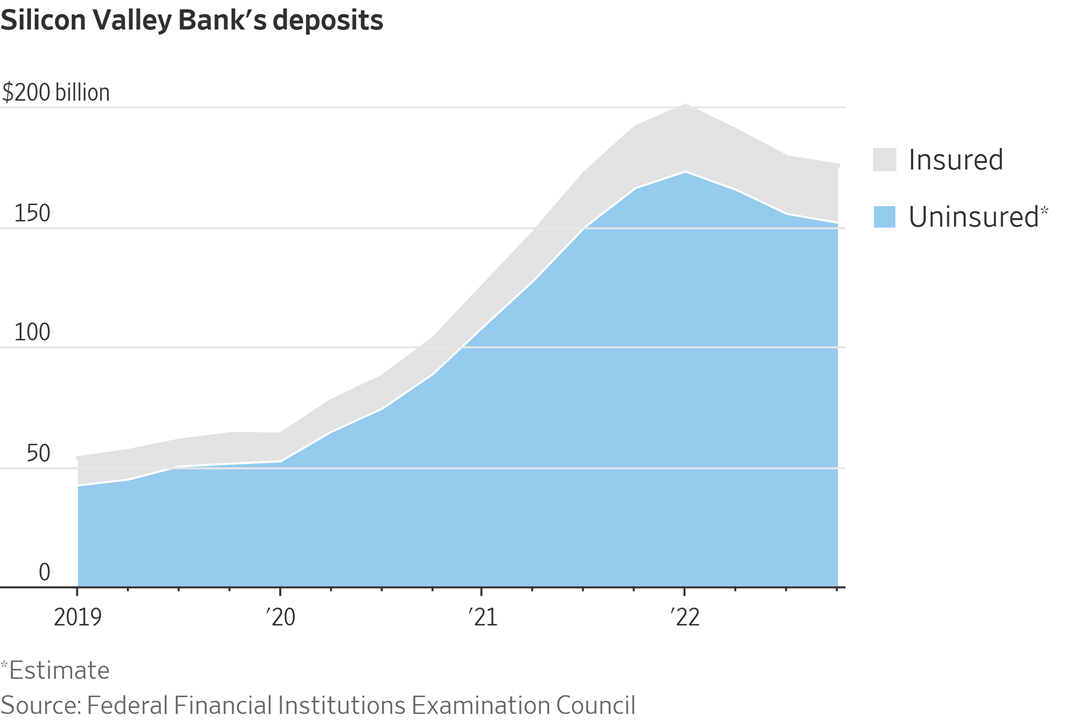
Equities today: Global stock markets were mostly lower overnight, while U.S. stock indexes are pointed toward narrowly mixed openings. Bank stocks, however, remained under the pressure with First Republic down 70% and leading the sector’s premarket decline. In Asia, Japan -1.1%. Hong Kong +2%. China +1.2%. India -1.5%. In Europe, at midday, London -1.8%. Paris -2%. Frankfurt -2.3%.
U.S. equities Friday: All three major indices registered losses for another week, with the Dow down 4.4%, the Nasdaq 4.7% lower and the S&P 500 dropped 4.6%.
On Friday, the Dow ended down 345.22 points, 1.07%, at 31,909.64. The Nasdaq lost 199.47 points, 1.76%, at 11, 139.89. The S&P 500 fell 56.72 points, .145%, at 3,861.59.
Agriculture markets Friday:
- Corn: May corn futures saw a 5 3/4-cent gain before closing at $6.17 1/4, down 25 1/2 cents on the week.
- Soy complex: May soybeans fell 3 3/4 cents to $15.07, and is down 11 3/4 cents on the week, while May meal closed $1.00 lower at $485.90 and May soyoil ended down 45 points at 56.61 cents.
- Wheat: May SRW wheat futures rose 13 1/2 cents to $6.79 1/4, near the session high and on the week lost 29 1/2 cents. May HRW wheat futures gained 21 cents to $7.98 1/4, near the daily high but down 18 cents on the week. Both markets scored contract lows early on today. Spring wheat futures settled 7 cents higher at $824 1/2, down 48 1/4 cents on the week.
- Cotton: May cotton futures saw losses of 400 points, settling at 78.18 cents, down 600 points on the week.
- Cattle: April live cattle futures fell 52 1/2 cents to $164.275, near the session low and for the week dropped $1.15. May feeder cattle futures lost $1.90 to $203.575 and nearer the session low. For the week, May feeders gained $2.625.
- Hogs: Nearby April hog futures rallied $2.375 to $87.45 at Friday’s close, with a late surge powering the strong close. That represented a weekly rise of $2.90.
Ag markets today: Grain and soy futures mildly favored the downside overnight as anxiety with the U.S. banking situation triggered general risk aversion. As of 7:30 a.m. ET, corn futures were trading 2 to 5 cents lower, soybeans were steady to 2 cents lower, winter wheat futures were 4 to 6 cents lower and spring wheat futures were 1 to 2 cents lower. Front-month crude oil futures were around $1.30 lower, and the U.S. dollar index was down around 350 points.
Technical viewpoints from Jim Wyckoff:
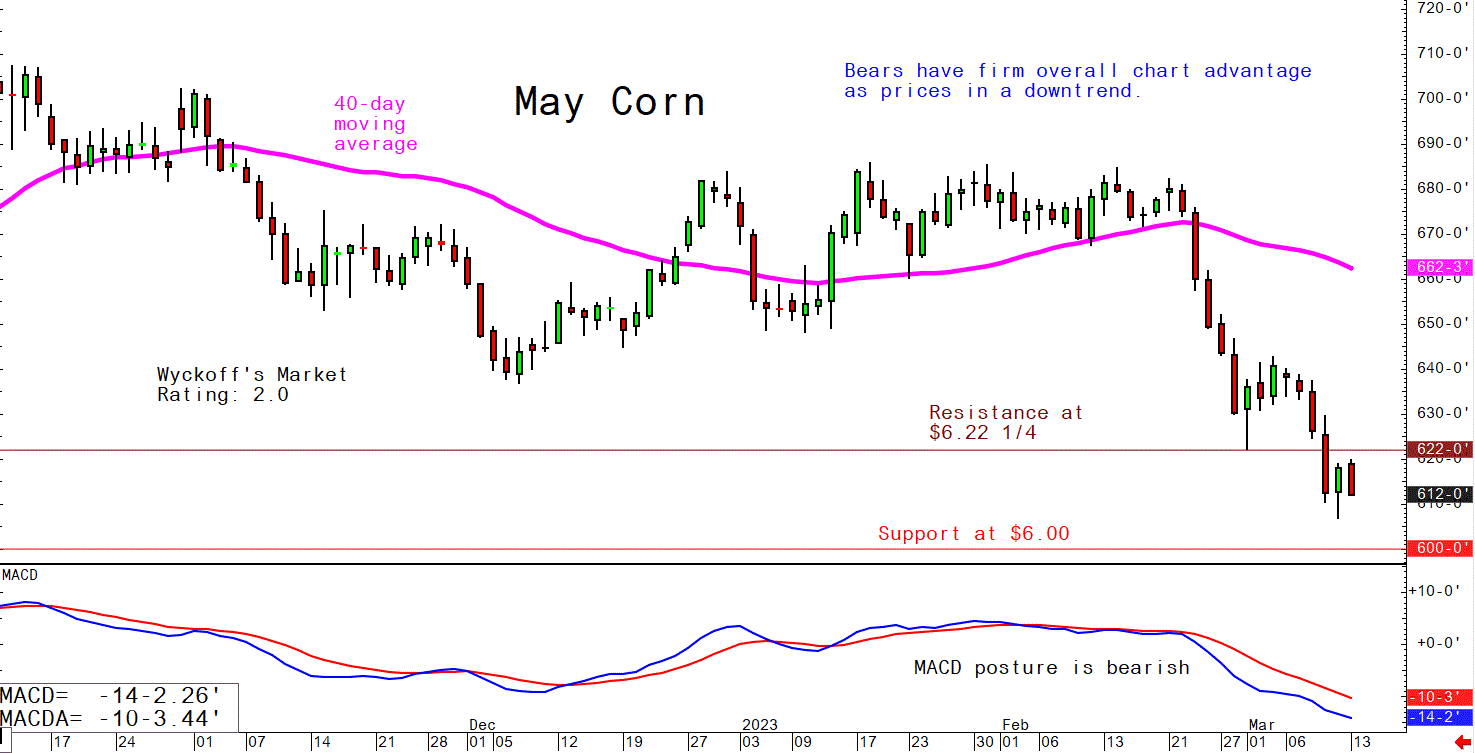
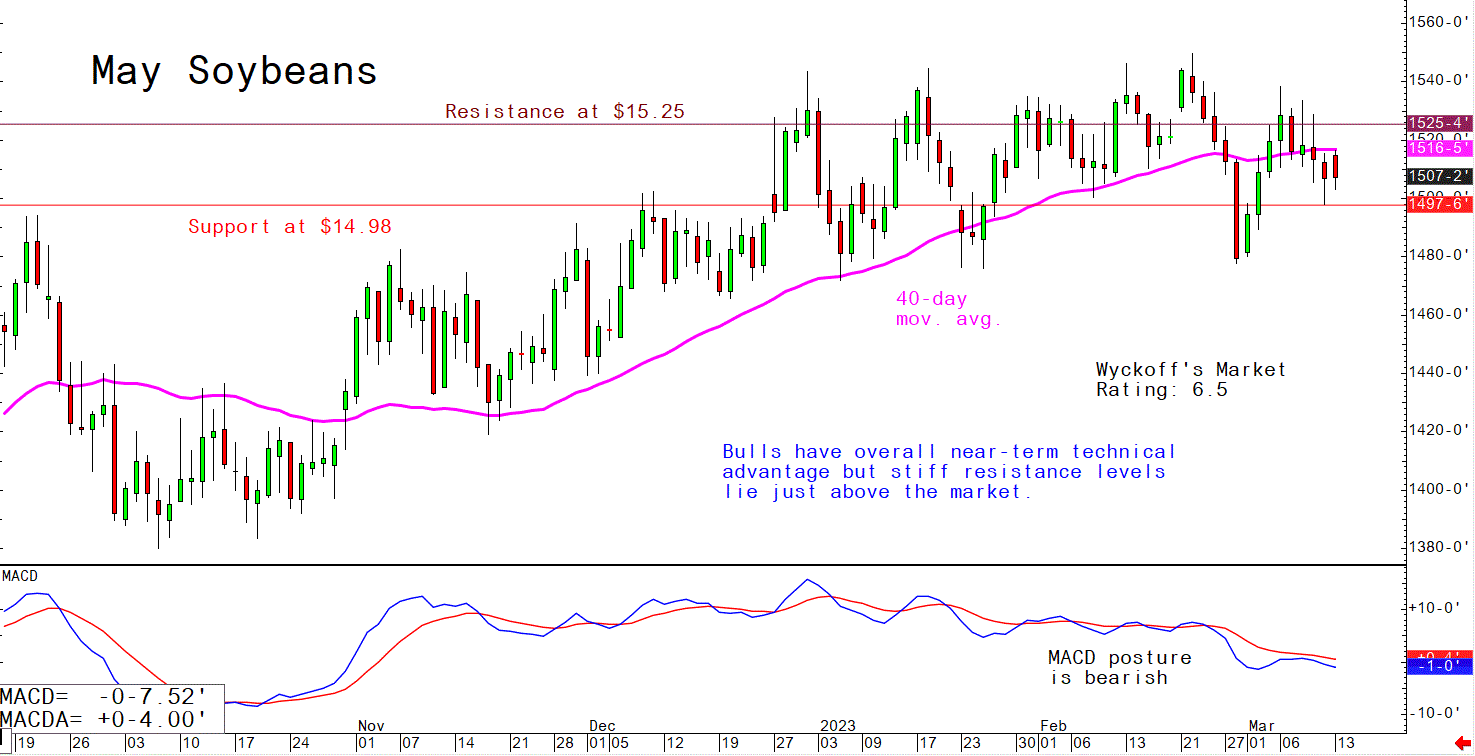
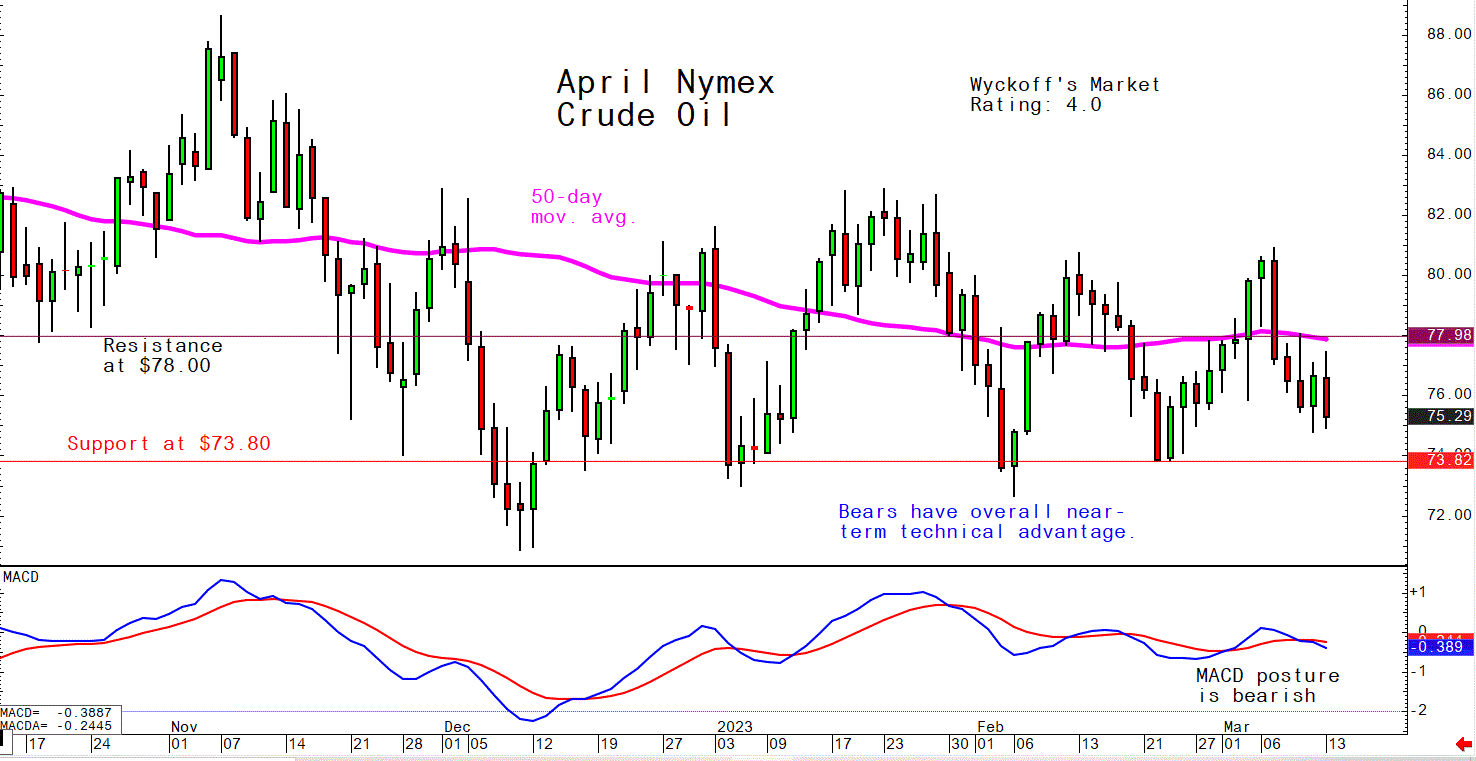
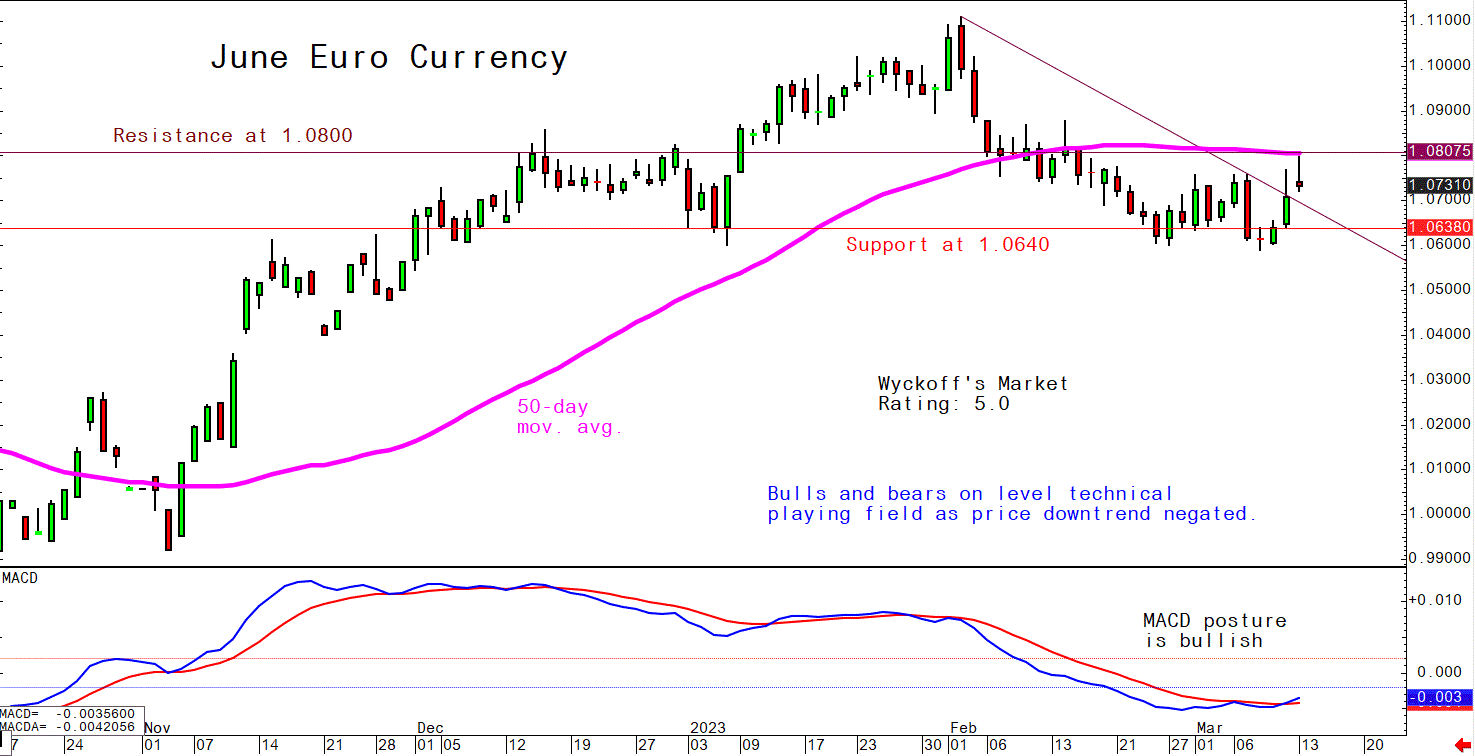
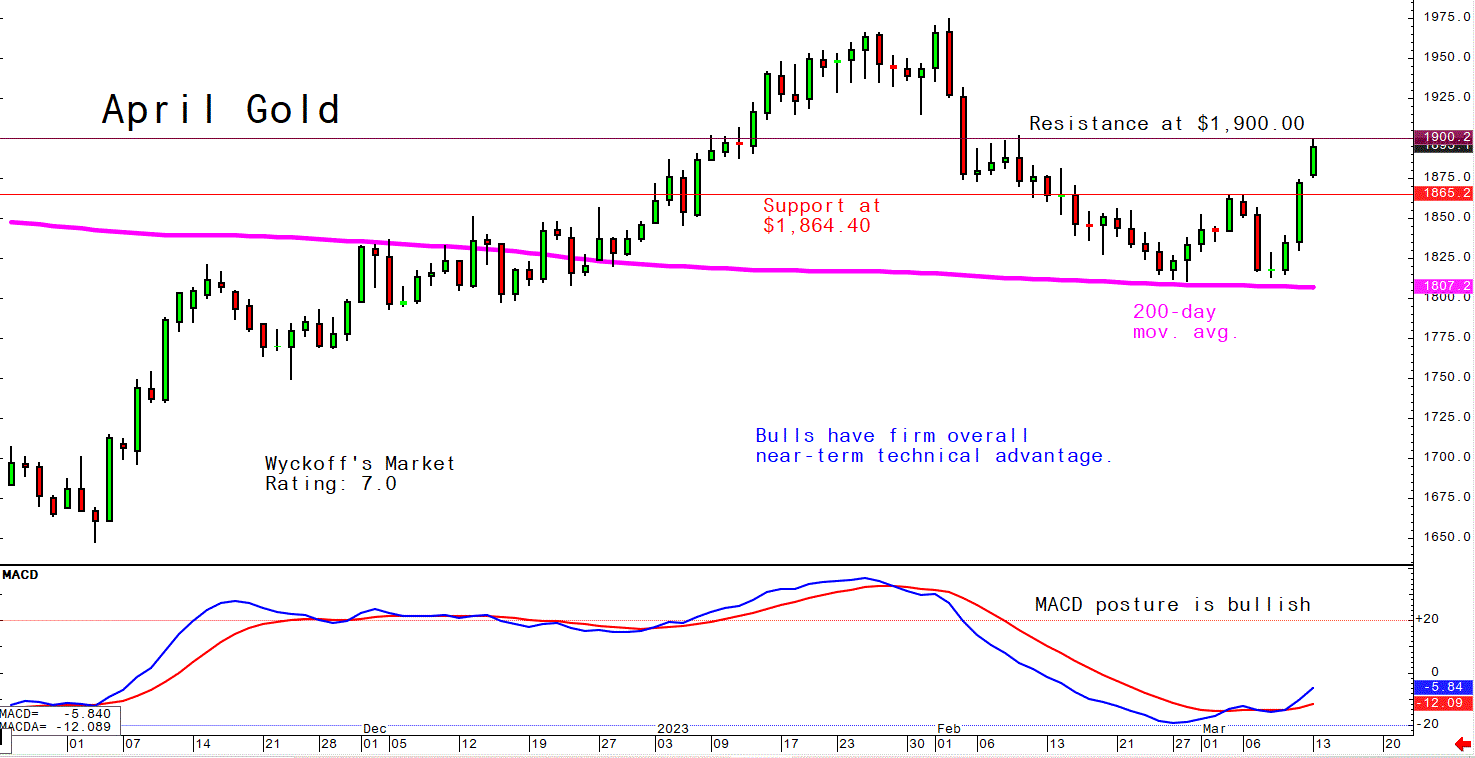
On tap today:
• President Joe Biden is due to speak on measures to bolster the U.S. banking system. UPDATE: President Biden defended the stability of the U.S. banking system on Monday morning after the stunning collapse of Silicon Valley Bank sparked fears of a major economic crisis. “Thanks to the quick action of my administration over the last few days, Americans can have confidence that the banking system is safe,” Biden said. “Your deposits will be there when you need them.”
• President Biden begins a three-day swing to California and Nevada. He meets today in San Diego with the prime ministers of the United Kingdom and Australia, discusses gun violence in Monterey Park, Calif., on Tuesday, and will headline a Las Vegas event on Wednesday focused on his ambition to lower prescription drug costs.
Will the Fed pull the rate increase plug sooner? Wall Street veteran Ed Yardeni said in a note that the Silicon Valley Bank’s failure could lead the Federal Reserve to wrap up its rate hiking campaign sooner than expected. “If the Silicon Valley Bank run is that something, it could mean tightening ends sooner and bond yields have peaked,” wrote the president of Yardeni Research. “We can’t say for sure that’s the case but can say the debacle should keep the tech sector mired in its rolling recession for longer… While the SVB crisis doesn’t change our economic and stock market outlooks for now, it adds uncertainty until resolved in a way that minimizes systemic shock,” he added.
Eurozone inflation: German postal workers given double-digit pay rise to avert strike. The move came after Deutsche Post DHL Group agreed to double-digit pay rises, which will compensate its workers for higher living costs but add to central bankers’ fears about persistently high inflation. The two-year pay deal covering 160,000 employees was agreed in last-ditch negotiations after 86% of Deutsche Post workers last week voted in favor of an indefinite strike.
Record breaking year for Saudi’s Aramco oil company. Saudi Arabia’s Aramco oil company announced that it had a record-breaking year for profits, bringing in $161.1 billion, a 46.5% increase for the company. Most of the profits will go to the Saudi government, which owns 95% of Aramco shares. Aramco said the profits were “underpinned by stronger crude oil prices, higher volumes sold and improved margins for refined products.”
Market perspectives:
• Outside markets: The U.S. dollar index is lower after hitting a three-month high last week. The dollar index fell toward 104 on Monday, sliding for the third straight session as investors assessed the prospect of further systemic risk following the collapse of Silicon Valley Bank, though U.S. regulators announced plans to backstop depositors and provide a new lending program to financial institutions. The failure of SVB also gave rise to speculations that the Federal Reserve could take a less aggressive approach to policy tightening to avoid further risks to the financial system. U.S. Treasury prices are also solidly up (yields down) on flight-to-quality buying. Meantime, Bitcoin prices are sharply up. Crude oil futures were low, with U.S. crude around $72.90 per barrel and Brent around $78.90 per barrel. Gold prices have extended late last week’s sharp gains and have hit a four-week high near $1,900 an ounce today. Safe-haven demand is featured in the metal. Gold and silver futures were stronger, with gold around $1,898 per troy ounce and silver around $21.36 per troy ounce.
• 20,522: Carloads of grain carried by U.S. railroads in the week ended March 4, down 17.4% from 2022, according to the Association of American Railroads.
• Ag demand: Saudi Arabia purchased 1.043 MMT of optional origin wheat. Tunisia tendered to buy 234,000 MT of optional origin soft milling wheat. Algeria tendered to buy 50,000 MT of optional origin soft milling wheat.
• NWS weather outlook: There is a Moderate Risk of excessive rainfall over parts of California... ...Heavy snow over parts of the Northeast and the highest elevations of the Cascades, Sierra Nevada, and the Northern Rockies... ...A Nor Easter will develop along the Northeast Coast.
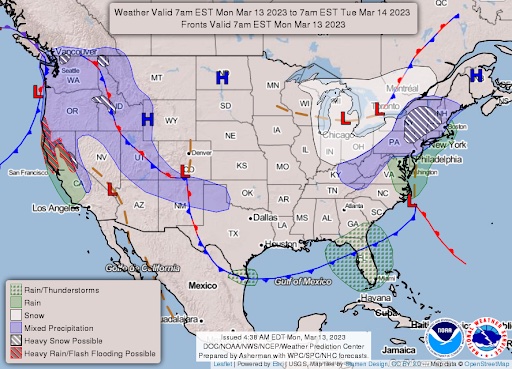
Items in Pro Farmer's First Thing Today include:
• Weaker commodity tone to start the week
• Black Sea grain deal talks start as deadline looms
• Argentina will receive some rains this week.
• China sells nearly all wheat put up for auction
• Indonesia to raise palm oil reference price
• Cattle traders remain overly cautious
• April futures build premium to cash index
|
RUSSIA/UKRAINE |
— Oleksandr Syrskyi, a top Ukrainian general, said that the Wagner Group of Russian mercenaries were suffering “significant losses” in Bakhmut. Russia has been trying to seize the town in eastern Ukraine for months, despite it serving little strategic value. The Wagner Group’s leader, Yevgeny Prigozhin, said his forces were nearing the town center but that Ukrainians were “fighting for every meter.”
|
POLICY UPDATE |
— The House Freedom Caucus put a major new ultimatum Friday on the debt ceiling, laying out a steep set of demands to earn their votes. The far-right group’s planks include $130 billion in spending reductions, tougher work requirements on federal aid to the poor, capping future budgets for federal agencies at fiscal year 2022 levels, clawbacks of federal spending on climate and the IRS, and the end of President Biden’s student loan relief plan. Timeline for the official GOP budget plan, whatever it will be, keep slipping. Some signal a May date.
|
CHINA UPDATE |
— China's central bank and finance chiefs retain spots in cabinet shake-up. China's parliament on Sunday approved the cabinet line-up nominated by Premier Li Qiang, who took office on Saturday in a once-in-five years reshuffle. During the National People's Congress (NPC), Xi Jinping was confirmed for a third five-year term as president. Here are key personnel moves made during the NPC, which closes today (Source: Reuters):
- China's four new vice premiers:
— Ding Xuexiang, 60, is the first-ranked vice premier who also sits in the ruling Communist Party's Politburo Standing Committee, China's top echelon of power. He is a trusted acolyte of Xi, and was Xi's chief of staff first in 2006 in Shanghai and for the past 10 years in Beijing.
— He Lifeng, 68, replaces Liu He as the next economic tsar. He is a long-time ally of Xi and was formerly in charge of the National Development and Reform Commission (NDRC), the powerful state planning agency.
— Zhang Guoqing, 58, has a PhD in economics and spent 20 years working in defense corporations before turning to politics and holding top positions in the provincial-level cities of Chongqing and Tianjin, as well as in Liaoning province.
— Liu Guozhong, 60, was formerly Communist Party chief of Shaanxi province, where Xi has ancestral roots.
- China's five new state councilors, who rank below the vice premiers but above cabinet ministers:
— Li Shangfu, 65, also becomes the defense minister. He had worked in China's satellite program and is under U.S. sanctions over the purchase of combat aircraft and equipment from Russia's main arms exporter, Rosoboronexport.
— Wang Xiaohong, 65, also holds the post of public security minister, or police chief. He is considered a close ally of Xi, having worked as a police chief in the city of Fuzhou when Xi was party chief there in the early 1990s.
— Wu Zhenglong, 58, is secretary-general of the state council and was formerly party chief of Jiangsu province.
— Shen Yiqin, 63, becomes the highest-ranking woman in China. Observers were surprised when the Communist Party broke with tradition and did not appoint any woman to its 24-member Politburo in October. For the first time in decades there were no female vice premiers as well. Shen, the former party chief of Guizhou province, is the only female state councilor.
— Qin Gang, 57, is also the foreign minister. The former ambassador to the United States had worked closely with Xi when he was chief protocol officer between 2014 and 2018. The only cabinet-level personnel changes were at the NDRC and the defense ministry.
- The following cabinet ministers held on to their positions:
— Yi Gang, 65, unexpectedly stays on as governor of the People's Bank of China. Yi, appointed as PBOC governor in 2018, had widely been expected to retire after being left off the ruling Communist Party's Central Committee during the party's once-in-five-years congress in October.
— Zheng Shanjie, 61, takes over from He Lifeng as head of the National Development and Reform Commission. Zheng has spent most of his career in his native Fujian province where he had served as director of Fujian Provincial Development and Reform Commission and vice governor of Fujian province.
— Liu Kun, 66, remains as minister of finance, another surprise since he is past the usual retirement age of 65.
— Wang Wentao, 58, stays on as minister of commerce. He had served as governor of Heilongjiang province and was once Xi's colleague in Shanghai.
— Jin Zhuanglong, 59, stays on as minister of industry and information technology.
— Wang Zhigang, 65, remains minister of science and technology.
— Huai Jinpeng, 60, remains minister of education
— Pan Yue, 62, remains head of the National Ethnic Affairs Commission
— Wang Xiaohong, 65, remains minister of public security
— Chen Yixin, 63, remains minister of state security. Considered a Xi ally, he had worked with Xi when the latter was party chief of Zhejiang province from 2002-2007. Chen was sent to the central city of Wuhan in 2020 to help lead anti-COVID efforts and in recent years led to purge corrupt security and legal officials.
— Tang Dengjie, 63, remains minister of civil affairs
— He Rong, 60, remains minister of justice
— Wang Xiaoping, 59, remains minister of human resources and social security
— Wang Guanghua, 59, remains minister of natural resources
— Huang Runqiu, 59, remains minister of ecology and environment
— Ni Hong, 60, remains minister of housing and urban-rural development
— Li Xiaopeng, 63, remains minister of transport
— Li Guoying, 63, remains minister of water resources
— Tang Renjian, 60, remains minister of agriculture and rural affairs
— Hu Heping, 60, remains minister of culture and tourism
— Ma Xiaowei, 63, remains head of the National Health Commission
— Pei Jinjia, 59, remains minister of veterans affairs
— Wang Xiangxi, 60, remains minister of emergency management
— Hou Kai, 60, remains auditor-general of the National Audit Office
- China elevated a general under U.S. sanctions to defense minister. The appointment complicates military dialogue efforts with relations between Washington and Beijing at a new low.
— A new Gallup poll finds a record-low 15% of Americans view China favorably, down 38 points in the last five years. Since 2007, Republicans’ views of China have remained lower than Democrats’, although favorable views have fallen steadily over the past five years among both parties. Link for details.
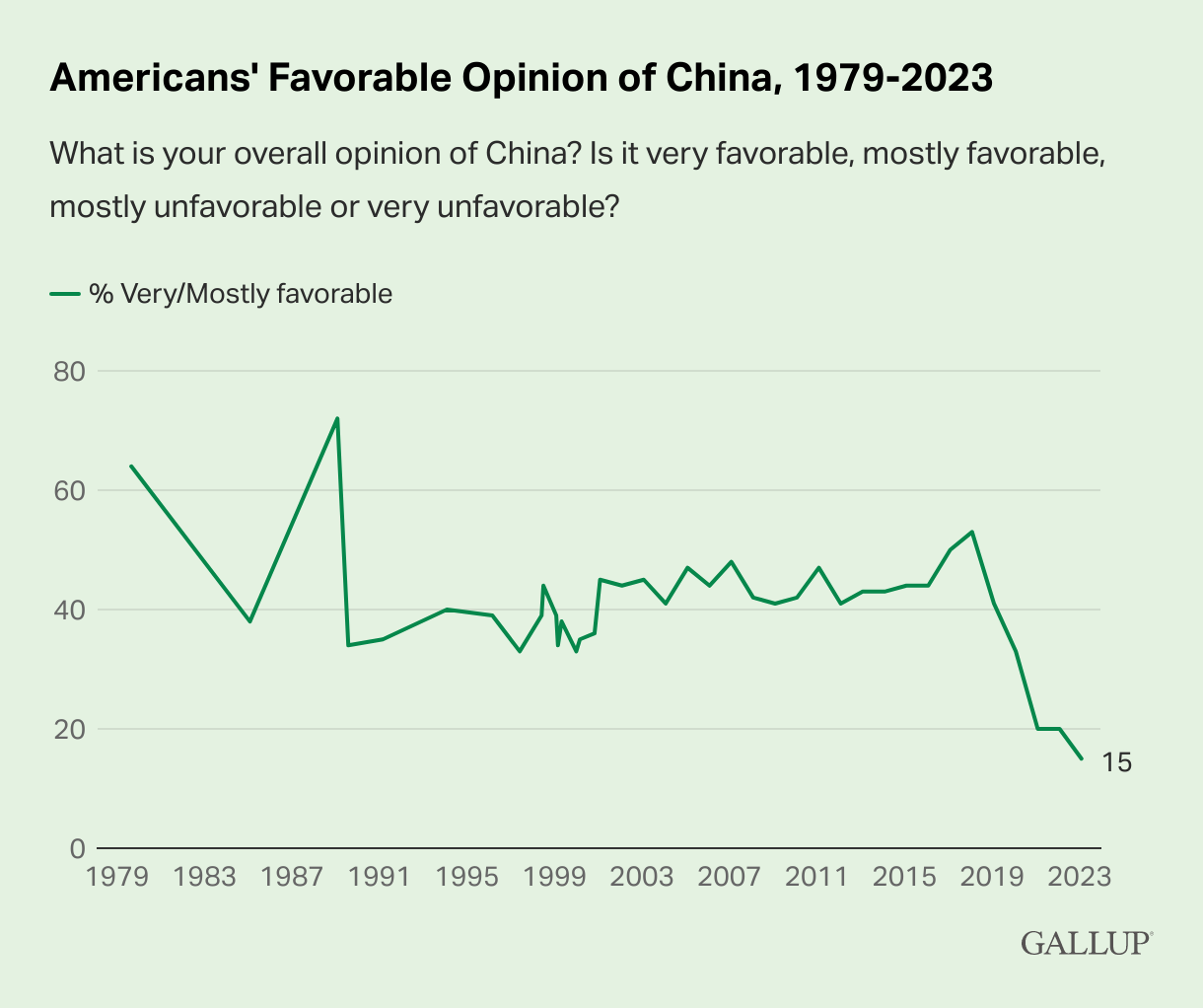
— Beijing is tightening its military grip around crucial shipping lanes in the South China Sea. The Wall Street Journal reports (link) China has become dominant in the region after gradually changing both the geography and balance of power in the area over the past decade. Beijing’s reach could now enable the country to obstruct or interfere with international trade, military experts say. Its large coast guard harasses offshore oil-and-gas operations of Southeast Asian nations and its fishing militia swarms the rich fishing waters, lingering for days. The article says the broader challenge posed by China to America’s long pre-eminence in the region puts U.S. allies and the world’s supply of advanced semiconductors produced in Taiwan at risk. Former U.S. and Southeast Asian officials and security analysts warn that China’s gains are so entrenched that they are unlikely to be reversed short of military conflict.
|
ENERGY & CLIMATE CHANGE |
— On Tuesday, the EU will unveil its Net Zero Industry Act, an effort to regain the initiative in clean technology production in Europe. The plan, according to draft proposals seen by the Financial Times, is to enable homegrown green energy businesses to produce 40% of the bloc’s capacity needs in five low carbon technologies — solar, wind, heat pumps, batteries and electrolyzes.
President Joe Biden and European Commission President Ursula von der Leyen met Friday to try to complete a plan that the White House hopes will temper a spat between the U.S. and European Union over electric vehicle tax credits. Speaking to reporters outside the White House following the meeting, von der Leyen said, "Today, we agreed that we will work on critical raw materials that have been sourced or processed in the European Union and give them access to the American market as if they were sourced in the American market."
— The Interior Department will announce it will write new regulations protecting nearly 13 million acres in the National Petroleum Reserve-Alaska, including ecologically sensitive areas that provide habitat for thousands of caribou and shorebirds, the White House says. The moves come as the Biden administration is poised to approve the multibillion-dollar Willow project on Alaska's North Slope as soon as today.
|
LIVESTOCK, FOOD & BEVERAGE INDUSTRY |
— Fake sugar use in processed foods has surged. Artificial sweeteners and other sugar substitutes sweeten foods without extra calories. But studies show the ingredients can affect gut and heart health. Link to details via the Washington Post.
— Moooove over: How single-celled yeasts are doing the work of 1,500-pound cows. So says a Washington Post article (link) that notes: “Cowless dairy is here, with the potential to shake up the future of animal dairy and plant-based milks.”
— Chick-fil-A is planning a $1 billion international expansion. The Atlanta-based company said it plans to open restaurants in Europe and Asia by 2026, with locations in five international markets by 2030. Andrew Cathy, the company’s third-generation CEO, said in an interview that Chick-fil-A has plenty of room to grow in the U.S., but that an international presence is necessary as the family-owned business charts its future.
|
HEALTH UPDATE |
— Japan will drastically ease Covid-19 mask-wearing guidelines for public transportation, schools and theme parks. The move comes ahead of the Japanese government's decision to downgrade Covid-19 to the same level as the seasonal flu on May 8. Japan fully reopened its borders to overseas visitors last October after more than two years of pandemic restrictions, ending one of the world’s strictest border controls.
|
POLITICS & ELECTIONS |
— An early look at 2024 House races. Inside Elections (Nathan L. Gonzales, Jacob Rubashkin, and Erin Covey) released their initial 2024 House overview. Some highlights:
- This cycle is less complicated with district lines mostly in place.
- Republicans’ narrow 222-213 majority means there’s still plenty of uncertainty about which party will control the chamber in 2025.
- House battleground: 66 competitive races, with each party defending 33 of the vulnerable seats: “A function of an evenly divided Congress in an evenly divided country.”
- Dems need a net gain of five seats for a majority. “But that number obscures the added disadvantage Democrats will have if Republicans are able to draw new, friendlier congressional maps in Ohio and North Carolina.”
- Joe Biden carried 11 of the 12 initial toss-up races in 2022. “Democrats will likely need to replicate 2022, when they overperformed and won the vast majority of toss-up races.
- Bottom line: “It looks like Republicans have a narrow initial advantage to hold the House, but the top of the ticket will matter once again.”
— New York House races key for chamber control. If New York Democrats won in House districts that preferred Joe Biden for president, they’d still control Congress. In New York, Republicans were victorious in six districts won by Biden — three on Long Island, two in the Hudson Valley, and one in Syracuse.
— As for 2024 Senate races, the GOP has a big advantage in the number of lawmakers up for re-election. But problematic candidates are emerging in must-win races. But unlike 2020 Senate races, the GOP has a different NRSC chairman, this time Steve Daines of Montana. He has taken an active role in recruiting strong candidates to run in battleground races — a lot different than his hands-off predecessor, Rick Scott of Florida.
- One possibility: Popular West Virginia Gov. Jim Justice will likely announce a run against Sen. Joe Manchin (D-W.Va.) in the coming weeks. Justice would face a competitive primary against Rep. Alex Mooney (R-W.Va.), a Freedom Caucus member.
- In Montana: Tim Sheehy is a 37-year-old Navy SEAL and Purple Heart recipient who founded two successful businesses and thus would have ample campaign funds. He would go up against popular Democratic Sen. Jon Tester.
- In Ohio, Club for Growth president David McIntosh has urged Rep. Warren Davidson (R-Ohio) to run for Senate against Sen. Sherrod Brown (D-Ohio). Brown is a likely favorite for re-election. Davidson, a Freedom Caucus member, is viewed by many as less electable than other prospective candidates.
- In Pennsylvania, a hard state to win for Republicans, far-right 2022 gubernatorial nominee Doug Mastriano may run for Senate against Sen. Bob Casey (D-Pa.). But Daines wants former hedge fund executive David McCormick to run, seeing Mastriano as unelectable.
- In Arizona, Kari Lake is mulling a Senate campaign against Sen. Kyrsten Sinema (I-Ariz.) and Democrat Ruben Gallego after losing a bid for governor last year. Lake continues to deny that she lost her election and that former President Trump lost in 2020.
Also, several House Republicans plan to run for competitive Senate seats in 2024. If they vote to cut Medicare, Social Security or other entitlement programs, they could badly hurt their own chances.
|
CALENDAR OF KEY EVENTS AND REPORTS |
Link to The Week Ahead filed on Sunday.
Monday, March 13
• President Joe Biden travels to San Diego, California, where he will meet with U.K. Prime Minister Rishi Sunak and Australian Prime Minister Anthony Albanese to discuss the AUKUS Partnership.
• Global food challenges. Wilson Center's China Environment Forum virtual discussion on “The Blue Planet Turns Green: Algae Fouls Waters as the World Struggles to Grow More Food in a Changing Climate.”
• Supply chains and reliance on China. Hudson Institute discussion on “Rethinking Supply Chains and Shipping to Reduce America's Vulnerability to China.”
• Transportation issues. American Public Transportation Association 2023 Legislative Conference with remarks from Deputy Transportation Secretary Polly Trottenberg and White House Senior Adviser to the President and Infrastructure Coordinator Mitch Landrieu; runs through Wednesday.
• FY 2024 budget - Defense. Defense Department series of briefings on the president's FY 2024 defense budget.
• FY 2024 budget: NASA. National Aeronautics and Space Administration media teleconference on the Biden/Harris Administration's FY 2024 funding request for the agency.
• Electricity issues. United States Energy Association virtual discussion on “Crisis Ahead for Electric Utilities as Electrification Picks Up.”
• Biodiversity. American Society of International Law virtual discussion on “A Peace Pact with Nature: CBD (Convention on Biological Diversity), COP15 and the future of biodiversity conservation.”
• Russian war in Ukraine. Carnegie Endowment for International Peace virtual discussion on “Unpacking the Ukrainian Battlefield.”
• Energy reports. S&P Global Commodity Insights’ Fujairah Bunkering & Fuel Oil Forum, UAE; runs through Wednesday.
• USDA reports. AMS. Export Inspections ERS: Feed Grains: Yearbook Tables NASS: North American Grain and Oilseed Crushings
Tuesday, March 14
• USDA programs and rural communities. Bipartisan Policy Center virtual discussion on USDA Rural Development and “how USDA's programs have the capacity to lift up rural communities.”
• Price cap on Russian oil. American Enterprise Institute for Public Policy Research discussion on “Assessing the Russian Oil Price Cap.”
• Forced labor and immigration. U.S. Customs and Border Forced Labor Technical Expo; runs through Wednesday.
• Transportation issues. American Public Transportation Association 2023 Legislative Conference; runs through Wednesday.
• China, Taiwan and Russia/Ukraine situation. Intelligence and National Security Alliance virtual discussion on issues including China's military capabilities, technology innovation, space and cyber strategies, prospects for conflict in the Taiwan Straits and elsewhere in the Pacific and lessons from the Russia/Ukraine war.
• Rebuilding Ukraine. German Marshall Fund of the United States virtual discussion on “A Marshall Plan Blueprint for Ukraine.”
• China climate and clean energy. Center for Strategic and International Studies virtual book discussion on “Cooperating for the Climate: Learning from International Partnerships in China's Clean Energy Sector.”
• COVID and mortgages/housing. Cato Institute discussion on “Shelter from the Storm: How a Covid-19 Mortgage Meltdown Was Averted.”
• US-Russia relations. Johns Hopkins University Paul H. Nitze School of Advanced International Studies discussion on “The U.S. and Russia: Why Did Things Go Wrong and Where Do We Go from Here?”
• Infrastructure issues. Homeland Security Department meeting of the President's National Infrastructure Advisory Council including a report to the Council from the NIAC's Cross-Cutting Infrastructure Policy Challenges Subcommittee and a vote on Cross-Cutting Infrastructure Policy Challenges Subcommittee recommendations.
• IAEA in Ukraine. Center for Strategic and International Studies virtual discussion on “The IAEA (International Atomic Energy Agency) Mission in Ukraine.”
• U.S. Postal Service. Institute of World Politics discussion on “Transforming the United States Postal Service.”
• Economic reports: NFIB Small Business Optimism Index | CPI
• Energy reports. OPEC monthly oil market report | API US inventory report.
• USDA reports. ERS: Meat Price Spreads | Wheat Data | Dairy Data | Livestock, Dairy, and Poultry Outlook | Sugar and Sweeteners Outlook
Wednesday, March 15
• Farm bill listening session. House Ag Committee listening session on the farm bill reauthorization process, in Waco, Texas.
• FY 2024 budget. Senate Budget Committee hearing on “The President's FY 2024 Budget Proposal.” Office of Management and Budget (OMB) Director Shalanda Young testifies.
• Forced labor and immigration. Final day of the U.S. Customs and Border Forced Labor Technical Expo.
• Transportation/high-speed rail. Final day of the American Public Transportation Association 2023 Legislative Conference with a focus on high-speed rail.
• Brexit and U.K. Peterson Institute for International Economics virtual discussion on “Is Brexit Responsible for the U.K.'s Economic Woes?”
• Infrastructure issues. Government Executive Media Group virtual Infrastructure Forum including a discussion on “Increasing Costs: Inflation and Infrastructure Spending.”
• Infrastructure Act and drinking water. Senate Environment and Public Works Committee hearing on “Implementing IIJA (Infrastructure Investment and Jobs Act): Perspectives on The Drinking Water and Wastewater Infrastructure Act.” Radhika Fox, assistant administrator for the EPA Office of Water, to testify.
• U.S. border crisis. House Homeland Security Committee field hearing on “Failure by Design: Examining Secretary Mayorkas' Border Crisis.” U.S. Border Patrol Chief Raul Ortiz among those testifying.
• U.S./Brazil relations. Senate Foreign Relations Committee hearing on “The Future of U.S./Brazil Relations.”
• Semiconductor supply chains. New America virtual discussion on “North America's Semiconductor Moment,” focusing on supply chains across the U.S. and Mexico.
• Crypto and Blockchain. Bipartisan Policy Center discussion on “Crypto Crossroads: Navigating the Future of Crypto and Blockchain Policy.”
• Sustainable energy. Environmental and Energy Study Institute and the Business Council for Sustainable Energy release of the “2023 Sustainable Energy in America Factbook.”
• FY 2024 budget: GAO, CBO, GPO. Senate Appropriations Legislative Branch Subcommittee hearing on “FY 2024 Budget Requests for the Congressional Budget Office, the Government Accountability Office, and the Government Publishing Office.”
• Crypto legislation. Federalist Society for Law and Public Policy Studies virtual discussion on “Is Crypto Legislation Coming?”
• Biomass and carbon capture. United States Energy Association virtual discussion on “Biomass + CCS (carbon capture and storage), Is a Business Case for Energy and Climate Finally Becoming Real?”
• Economic reports. PPI-FD | Empire State Manufacturing Survey | Retail Sales | Business Inventories | Housing Market Index | Atlanta Fed Business Inflation Expectations
• Energy reports. IEA monthly oil market report | EIA Petroleum Status Report | Weekly Ethanol Production | Genscape ARA weekly crude inventory | Earnings: E.ON.
• USDA reports. NASS: Turkey Hatchery | Broiler Hatchery
Thursday, March 16
• USDA’s Vilsack testifies. Senate Ag Committee hearing on “Oversight of USDA. USDA Secretary Tom Vilsack to testify.
• Spring weather outlook. National Oceanic and Atmospheric Administration virtual news conference on “The U.S. Spring Outlook, including predictions for temperature, precipitation, drought, and flood risk across the country.”
• FY 2024 budget. Senate Finance Committee hearing on “The President's FY 2024 Budget.” Treasury Secretary Janet Yellen to testify.
• Renewable energy, batteries and green technology. Washington Post Live virtual discussion on “The Role of Renewable Energy and Battery Technology in the Push Toward a Greener Economy.”
• Infrastructure and transportation. Senate Banking, Housing and Urban Affairs Committee hearing on “Local Views on Public Transportation, Transit Infrastructure and Operations, and Federal Transit Programs.”
• Petrochemical outlook. Information Technology and Innovation Foundation virtual discussion on “Petrochemicals Without the Petro: A New Earth Shot?”
• AUKUS alliance. Carnegie Endowment for International Peace discussion on “Making AUKUS (Australia-United Kingdom-United States) Work for the U.S./Australia Alliance.”
• Energy outlook. Resources for the Future discussion on the U.S. Energy Information Administration's (EIA) “2023 Annual Energy Outlook.”
• FY 2024 budget and appropriations. CQ Roll Call and FiscalNote webinar on “From Proposals to Policies: A Guide to the 2024 Federal Budget and Appropriations.”
• U.S. Federal Reserve. American Enterprise Institute for Public Policy Research discussion on “Limitless: The Federal Reserve Takes on a New Age of Crisis.”
• Economic reports. Jobless Claims | Import & Export Prices | Housing Starts | Philadelphia Fed Manufacturing
• Energy reports. EIA Natural Gas Report | Singapore onshore oil-product stockpile weekly data |Angola preliminary crude exports plan (May) | WTI April options expire | Earnings: Enel.
• USDA reports. FAS: Export Sales
Friday, March 17
• Forced labor in China. Hudson Institute discussion on “Regulatory and Reputational Risk in China: Forced Labor and the U.S. Government's Contribution to a Global Response.”
• Global economic outlook. Organization for Economic Co-Operation and Development presentation on the “Interim Economic Outlook.”
• China situation. Clare Boothe Luce Center for Conservative Women discussion on “The Communist China Threat.”
• Economic reports. Industrial Production | Consumer Sentiment | Leading Indicators
• Energy reports. ICE weekly Commitments of Traders report for Brent, gasoil | Baker-Hughes Rig Count | CFTC Commitments of Traders
• USDA reports. NASS: Honey | Cattle on Feed | Hop Stocks | Peanut Prices
|
KEY LINKS |
WASDE | Crop Production | USDA weekly reports | Crop Progress | Food prices | Farm income | Export Sales weekly | ERP dashboard | California phase-out of gas-powered vehicles | RFS | IRA: Biofuels | IRA: Ag | Student loan forgiveness | Russia/Ukraine war, lessons learned | Russia/Ukraine war timeline | Election predictions: Split-ticket | Congress to-do list | SCOTUS on WOTUS | SCOTUS on Prop 12 | New farm bill primer | China outlook | Omnibus spending package | Gov’t payments to farmers by program | Farmer working capital | USDA ag outlook forum |

